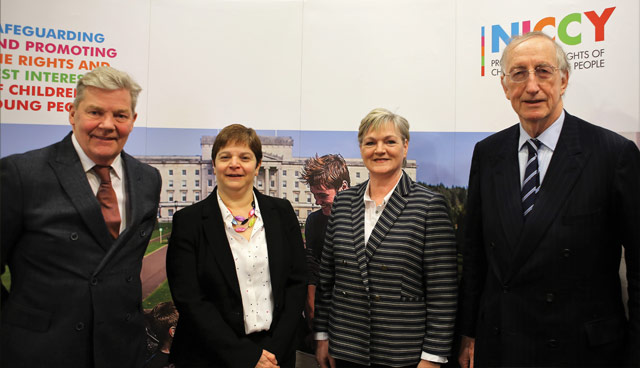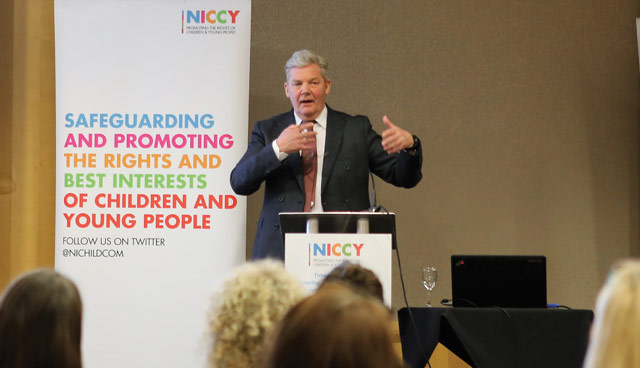Without delay: The need for a new child friendly justice model for child victims of sexual violence

The need to ensure our justice system better supports child victims of sexual violence came into sharp focus at a recent seminar convened by the Northern Ireland Commissioner for Children and Young People (NICCY). Lengthy delays in cases progressing to trial, re-traumatisation of children and low rates of conviction were highlighted as all too common features throughout a criminal justice system in need of urgent transformation.
At NICCY’s Time for Change event in March, Sir John Gillen, recently retired from his role as Lord Justice of Appeal, provided a stark insight into his recent Review into the law and procedures in serious sexual offences in Northern Ireland. “Child victims are living in dark times,” he said. “Towering above all recommendations is the need to introduce a cultural change in our attitude and approach to children in our criminal justice system.”
The Commissioner, Koulla Yiasouma, is responsible for safeguarding and promoting the rights and best interests of children and young people in Northern Ireland. This includes raising awareness of children’s rights and reviewing the adequacy and effectiveness of law, services and practice. The Time for Change seminar brought together experts from across the criminal justice and child protection systems to identify ways of achieving better outcomes for children and for justice itself.
Set out in NICCY’s founding legislation is the requirement for the Commissioner to have due regard to the United Nations Convention on the Rights of the Child (UNCRC). Ratified by the UK Government in 1991, the Convention highlights across a range of articles that, as rights-holders, children are afforded special rights to protection from violence, abuse, exploitation and trafficking and that they should be supported in their recovery from abuse.
In Northern Ireland, more than half of all reported sexual offences are committed against children and instances of abuse continue to rise. Moreover, the NPSCC has estimated that for every child on a child protection plan or register another eight were experiencing maltreatment or abuse.
In 2016, following examination of how well the UK and devolved governments were implementing the UNCRC, the UN Committee on the Rights of the Child reminded the Northern Ireland government of the importance of implementing the recommendations of the Independent Inquiry into Child Sexual Exploitation of 2014. However, NICCY continues to have significant concerns about the lack of evidence to demonstrate that the large amount of work to take forward the Inquiry’s recommendations is leading to improved outcomes in how we protect children and pursue perpetrators.
Furthermore, in June 2018, the UK Government ratified the Council of Europe’s Lanzarote Convention on the Protection of Children against Sexual Exploitation and Sexual Abuse, an ambitious legal instrument designed to enhance the protections afforded by the UNCRC. It is these international standards that provide special attention and protection for children and they must be embraced if Northern Ireland is to have a justice system which delivers fairness and a higher quality of justice for all.
The criminal justice system in Northern Ireland takes twice as long as the system in England and Wales. Delays are increasing year-on-year and the greatest delay of all is found in serious sexual offences involving children, where cases take an average of 986 days from the beginning of the process to the end. These delays put an enormous strain on children and often act as a factor in attrition rates, can be a barrier to children fully accessing therapeutic support when it is needed most and hold children and families back from starting their journey to recovery.
Such delays are compounded by the current processes where multiple interviews are conducted with child victims, by different professionals often drawn out over many months or years. Through no fault of their own, children are often prevented from giving the best evidence in these serious cases by procedures which require a child or young person to recount a harrowing experience time and time again, and at trial to recount abuse which may have happened years before.
That children and adult victims of sexual violence often say what they are subjected to in court is psychologically more damaging than the abuse itself is a damning indictment of an outdated system and highlights the re-traumatisation that is associated with our arrangements. It is time to question whether conventional adversarial procedures are appropriate for child victims of sexual violence and abuse.
Services including the NSPCC Young Witness Service and special measures, which are available but inconsistently used by courts to offer support for vulnerable witnesses, are positive developments. However, the Time for Change seminar heard evidence from international experts that only system transformation through the move to a child friendly model will bring the change that is required.
Sir John Gillen: “It is crucial that if the best interests of children are to be protected that we abandon our traditional parochialisms and we make the concept of comparative law and continuing contact with our international friends in the arena of child protection, a cornerstone of all future child friendly developments.”
Barnahus model
Bragi Guðbrandsson, newly elected member of the United Nations Committee on the Rights of the Child and former Director General of the Icelandic Government Agency for Child Protection, at NICCY’s Time for Change event outlined the Barnahus model. First introduced in 1998, twice as many cases of suspected sexual abuse in Iceland have been investigated, the number of cases prosecuted has tripled and the same applies to the number of convictions secured on a yearly basis.

“No child or young person should be subjected to sexual violence or abuse and we must do everything we can to prevent this. But when abuse is disclosed, the very least we can do is to ensure that reporting, investigation and court processes in themselves do not cause or exacerbate trauma or distress.
Northern Ireland Commissioner for Children and Young People, Koulla Yiasouma
Adaptable to meet unique social, legal and political contexts, the model now operates in over 60 locations and is promoted by the Council of Europe. At its core, the child centred approach secures children’s best evidence, often over two interviews completed within a few weeks of disclosure. It minimises the need for multiple interviews and examinations, reduces delays in children’s access to therapeutic support, addresses attrition, deals authoritatively with delays in proceedings, improves prosecution and conviction rates and, respects due process.
Barnahus brings together all the relevant professionals ensuring an interdisciplinary approach. The model ensures that one single child and young person friendly setting is used to conduct all interviews and examinations, with these being led by a forensic interviewer. There is also minimal delay between a victim’s interviews and cross-examination and as all recordings are used as evidence during trial, the child is not required to attend court years later to give further testimony.
Thus the Barnahus model embeds the justice process within child protection procedures and by ensuring legal, social care and medical professionals work collectively, enables child victims to give the highest quality evidence they can as close in time to disclosure or investigation, while ensuring a fair trial while adhering to due process.
Commissioner for Children and Young People, Koulla Yiasouma was emphatic in her support for the introduction of new approach modelled on Barnahus in Northern Ireland: “No child or young person should be subjected to sexual violence or abuse and we must do everything we can to prevent this. But when abuse is disclosed, the very least we can do is to ensure that reporting, investigation and court processes in themselves do not cause or exacerbate trauma or distress.
“Minor changes here and there will be insufficient. We require system transformation, one that ensures investigative and judicial processes are fair to child victims and witnesses and can deliver a higher quality of justice for all involved. Sir John’s Review gives us a renewed impetus to redesign our system; one that respects due process and allows child protection and justice processes to work together to improve outcomes for children who are too often let down.
“We must build on the work of the Review. Changes to our current arrangements for child victims of sexual abuse and violence can be introduced without the need for new legislation and I am committed to working with government and statutory agencies to make change happen. Not acting is to continue to fail our most vulnerable children.”
Northern Ireland Commissioner for Children and Young People
Equality House, 7-9 Shaftesbury Square, Belfast BT2 7DP
T: +44 (0)28 9031 1616
E: info@niccy.org
W: www.niccy.org
Twitter: @nichildcom





